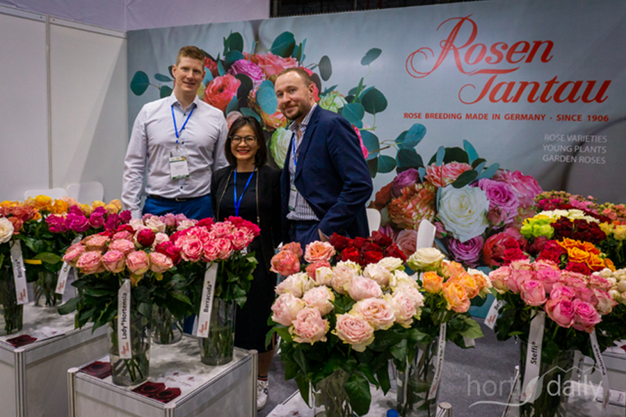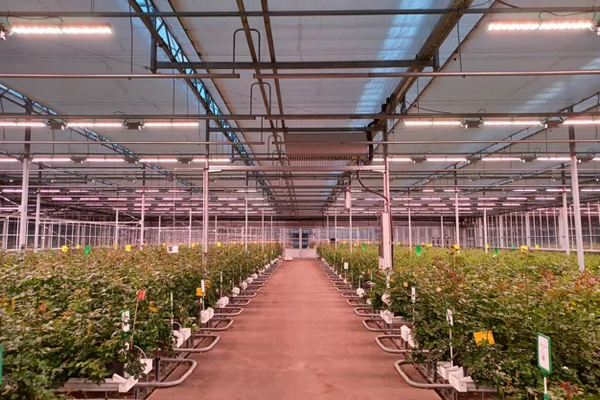At the Hortex in Vietnam, the Rosen Tantau stand was well-visited. Honesty demands us to tell it's not just because their varieties are high in demand, but mainly because the visitors adored the beautiful roses and took many photos and selfies with them. The team with Rosen Tantau is used to this – they have been pioneering in the Vietnamese industry for several years now, and are finally starting to see some commercial opportunities in this market. "It's a very new market for our rose varieties, but we believe it will continue to develop, and growers will see the benefits of the cooperation with us as a breeder."

Alexander Letkow, Lea Pham, and Alexander Brjuhins with Rosen Tantau at Hortex 2024 in Vietnam
"The demand for flowers, more precisely high-quality flowers, is growing. In Vietnam, flowers and plants are usually given away for birthdays or other festive occasions. Today, people increasingly start to buy flowers for decoration purposes." As an example, Alexander Brjuhins refers to the new apartment complexes built in Ho Chi Minh City, for the growing middle class. "Flowers and plants are an important feature, as you can see on all the balconies, but they also want to decorate the inside of these apartments with flowers," he says.
Although the chrysanthemum, Vietnam's most popular flower, is produced locally, many high-quality flowers continue to rely on imports. "Only a few local producers can meet that demand; hence, many high-quality flowers are imported from South America or the Netherlands."
Alexander Letkow explains that the local climate is the biggest challenge for growers at the moment. "The country's main growing region, Dalat, is situated at a higher altitude, which is a big plus. Nevertheless, during summer, humidity is a crucial factor." Sketching the flower chain in Dalat, they explain there's no central flower auction. "Larger wholesalers buy directly from larger producers and producer organizations, and smaller wholesalers buy from smaller growers or the larger wholesalers. Smaller shops go to the local markets."
Letkow and Brjuhins expect that this growing demand for high-quality flowers will bring Vietnamese growers to address their current challenges with investments in technological equipment, and better varieties.
They see there's a large gap between traditional and advanced growers. "Growers have to choose between growing traditionally and selling their product rather cheap - or investing in technology to match the demand, to be able to ask for higher prices and also export their products. Traditional growers cut only a few flowers per square meter, while advanced growers can achieve 150 and more flowers per square meter, in much better qualities."

It has been a long-term governmental policy to produce as much as possible inside the country and to steadily increase the production quality. "For this reason, growers will be forced to increase the level of technologies inside the greenhouse – and our highly productive varieties will become in demand as they will start to produce high-quality flowers. When growers start to enhance the technology and then the planting material, the newest variety selections will ultimately follow."
Since there are no local flower breeders available, and the varieties mostly come from European ones – either Dutch, German, or French – they decided to invest in this market a couple of years ago.
Experienced with their growing activities all over the world, the men already have an idea of which Rosen Tantau varieties will become potential best-sellers in the Vietnamese market. "The True Love or a variety of the Paloma family will be a good fit over here. Red remains the most important color." Alexander & Alexander explain that the company now works on an Eurasian selection, which includes the decreasing Western Europe market and the growing Asian and Eastern European markets. "These varieties are also fitted for the Vietnamese climate and production scenario. One of our local partners has some commercial trials, for instance with the True Love from the Eurasian selection, and it shows to be a promising red variety also here," they say.
In this upcoming industry, variety protection is indeed a challenge. Yet, according to Letkow and Brjuhins, this is about to change. "We understand that the market is at its very beginning; currently, people are pioneering. We believe that quite some growers, in particular the quality- and export-orientated ones, already recognize that it's important to pay royalties to get access to new varieties, technology, and our experience. More growers will follow that path. It's a win-win situation."
Rosen Tantau is convinced that Vietnam's increasing demand for high-quality flowers is there to stay. "As Vietnam is still a growing economy, we don't think that COVID-19 and the current developments in the Vietnamese housing market have a long-term impact on this general tendency. Vietnam is a country to watch out for the upcoming decades," they conclude.
For more information
Rosen Tantau
Alexander Letkow
Email: [email protected]
www.rosen-tantau.com
www.cutroses.rosen-tantau.com
Bilat Handel GmbH
Alexander Brjuhins
Email: [email protected]
www.bilat.de
